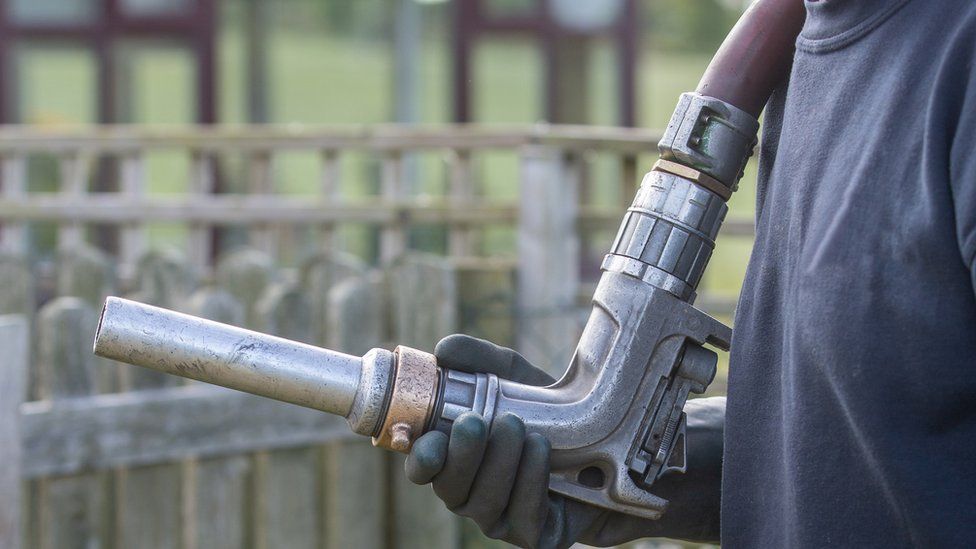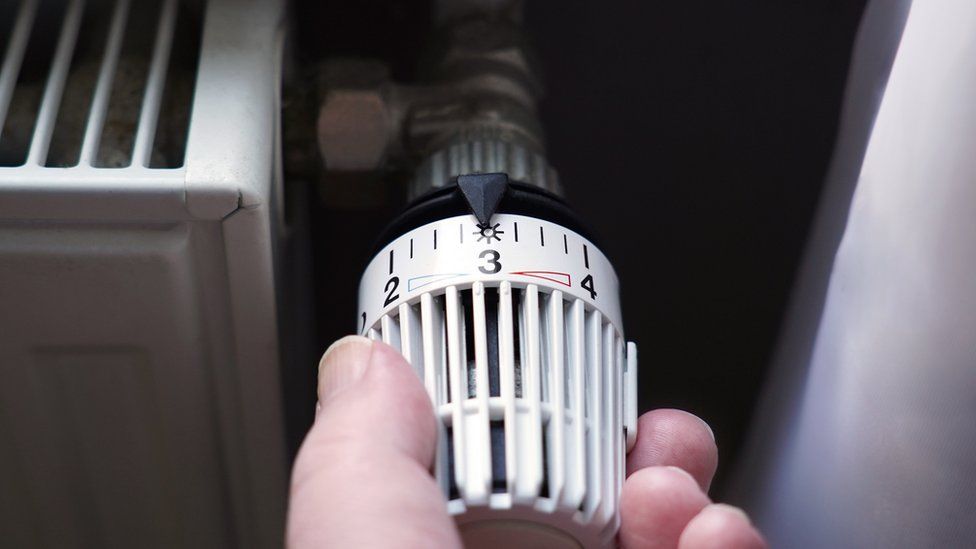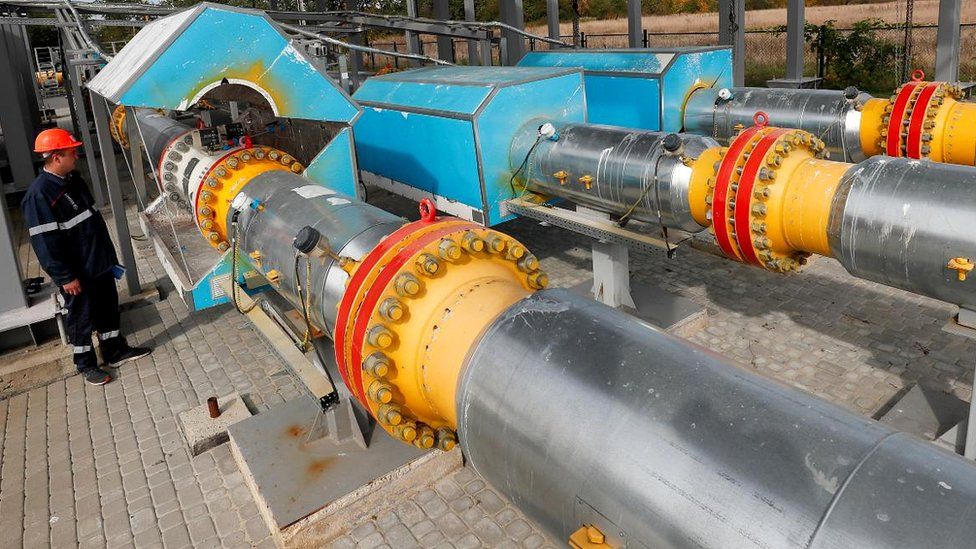Energy prices: NI oil prices up 35% since Russia invades Ukraine
 Image source, Getty Images
Image source, Getty ImagesNorthern Ireland's oil prices have shot up more than 35% in the week after Russia invaded Ukraine - so what does it mean for the UK's most oil-dependent nation?
More than two-thirds of homes in Northern Ireland rely on oil for heating - the highest percentage in Western Europe - compared to just 4% in England and Wales.
In the seven days after the invasion, the average price for 900 litres of home heating oil went up more than £200, from £555.72 on 24 February, to £758.11 on 3 March, figures from the Northern Ireland Consumer Council show.
Meanwhile the number of households in fuel poverty in Northern Ireland is predicted to have doubled, from 22% to more than 40%, according to National Energy Action (NEA).
It has also prompted a run on home heating oil, with some companies limiting their sales, or selling beyond their stock levels, so they will likely be selling at a loss if prices continue to rise.
Kettle baths to ration power
Pat Austin, NEA's Northern Ireland director, said the charity was seeing more people who had completely run out of fuel.
Two weeks ago they topped up oil for a man in Belfast whose tank had been empty since last August, she said.
The man, aged in his thirties, had been rationing his electricity by using his kettle to bathe - turning on the immersion heater for a shower just once a fortnight.
 Image source, Getty Images
Image source, Getty ImagesAs of Friday, a spot check of oil prices in Northern Ireland by the Consumer Council puts the average for 900 litres at £758.11.
That's a 44% rise since 3 February, when the average price was £527.97.
"These figures have to be putting fuel poverty in the region of 40% easy; it is a perfect storm," Ms Austin said.
"We're looking at emergency interventions. We're dealing with people who are out of electricity overnight, we are now having to send people on to food banks."
Why are oil prices rising?
Tensions between Russia and the West were already driving power prices up and that's accelerated since Russia invaded Ukraine last week, pushing them to 10-year highs.
Russia is one of the world's largest energy producers.
But it's now subject to a number of sanctions from Western nations, and that's reportedly causing problems for buyers of Russian oil.
Major oil and gas companies, including BP and Shell, have also announced plans to exit Russian operations.
And price rises are expected to continue in the near-term.
Oil prices have been climbing, like gas and electricity, but because oil is unregulated in Northern Ireland, cost increases are passed on directly to the buyer, Peter McClenaghan, director of infrastructure and sustainability at the Consumer Council, said.
"Russia supplies about 12% of global oil supplies so that's really worrying for Northern Ireland consumers because Northern Ireland consumers pay straight away what the world market is saying.
"Whereas with gas there's a time period before they can pass on increases, in oil that doesn't happen so those spikes in prices have been seen in Northern Ireland straight away, so it's a really significant, negative change for Northern Ireland consumers and one that's happened just virtually overnight."
 Image source, Reuters
Image source, ReutersIn 2016, when fuel poverty was last measured in Northern Ireland, it was at 22%, but estimates from the Housing Executive for in 2017 and 2018 put it as low as 17% and 18%.
But in 2009, fuel poverty levels were double that at 44% - and that's where NEA expects it to be in Northern Ireland now.
Community buys
Donna Lennon gets her oil via a social enterprise buying group, which reduces costs for its members by buying in bulk, and allows smaller purchases so customers avoid the higher costs of ordering low volumes directly from the supplier.
Without it, the single mother of two, who lives in Newcastle, County Down, said she would be in fuel poverty.
Northern Ireland also has several oil buying clubs, which work on a similar principle.
 Image source, Donna Lennon
Image source, Donna LennonShe said the discount she gets is the difference between running oil and heating the whole house, and using only her fireplace.
"Especially when you have a young family and your oil is on a lot, I would have to choose between that and wood, and just light a fire and sit in the sitting room.
"It could be the difference between heating the bedrooms and sitting in the living room for the fire."
James McGovern, from the buying group Fuel Round in County Down, said households were reducing the size of their orders as costs increased.
"Overall demand has noticeably risen since the Ukraine crisis, but the per-order volume is markedly down, as households grapple with increased costs."
Sale limits and selling at a loss
This week some Northern Ireland oil companies cut the volume of each sale.
Others sold beyond their stock levels, meaning they could lose money on orders when prices rise beyond what quoted for.
Damian Fusco, from Bangor Fuels, said: "The general public is under the impression that we have large stocks of oil - stock generally lasts days not weeks.
"Most heating oil retailers would have a volume of stock on their premises which they replenish daily - that volume is sold.
"I'm taking orders for more than week away which I haven't got the stock for, so it may by the time I get to that call I may have ended up having to pay more than that for the oil."

Northern Ireland imports all its oil via a handful of multinational suppliers.
That means local firms have no power to increase their orders to match demand.
On Tuesday, none of Omagh firm MAC Fuels' three suppliers would deliver oil, its company director Yvonne Wilson said.
They limited their sales to 400 litres this week.
"One customer has told me that she is working just to eat and heat, while another said its a case of keeping the house warm while his children get ready for school and bed. When the children aren't at home he just wears a coat rather than waste any oil -this is the reality of how families and the elderly are struggling at the minute."



No comments